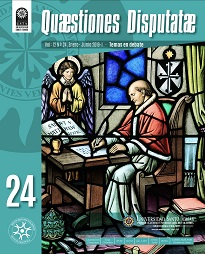The challenges of the university in the 21st century
Main Article Content
Abstract
Today we have to ask ourselves in depth: ¿What do you mean when you talk about university? Indeed, in the first instance it refers to a building or an academic community that seeks its professional training in order to "go out" to exercise what has been learned in the institution.
But, in the strictest sense, its main characteristic can be deepened: the Santo Tomás University assumes as a primary objective to train people with critical sense, impregnated with Christian human values based on responsibility for society, respect for God, for others and towards themselves. Students passionate about science, knowledge, intellectual dynamism, truth (in the style of Tomás de Aquino: Facientes veritatem), through the three substantive functions of Higher Education: learning, research and social commitment.
The USTA cannot be foreign to the socio-economic problems of the population, rather, it brings to society competent generations within the social, economic and political development of the Boyacá region, and local (Tunja) and, on all, through the quality of its managers, administrators, teachers, students, and its infrastructure, guarantors of development and progress. For this, teaching methods that should be anchored in modern or scientific psychology, such as experimental psychology, should be implemented. This is how the teacher enters into a secondary role in teaching. (Tamara, 2018, p. 142).
That is why the USTA, through the Department of Humanities and Comprehensive Training, gladly presents Volume 12 (No. 24) of the Quaestiones Disputatae Magazine: Topics under discussion, an example that reflects on this occasion a set of articles that respond to student culture, to the construction of discourse as the basis for a generation of new knowledge in Higher Education, encouraging the combination of science based on geotechnics with pedagogy, understanding the world through reading, teaching English from the context of each student, neuroscience from anthropology, and God's initiative through Revelation.
Let's recap and further clarify the initial problem of this editorial's problems: If the University is not a place for dialogue, for a true encounter between science, reason and faith, ¿where will young people seek the truth?
But, in the strictest sense, its main characteristic can be deepened: the Santo Tomás University assumes as a primary objective to train people with critical sense, impregnated with Christian human values based on responsibility for society, respect for God, for others and towards themselves. Students passionate about science, knowledge, intellectual dynamism, truth (in the style of Tomás de Aquino: Facientes veritatem), through the three substantive functions of Higher Education: learning, research and social commitment.
The USTA cannot be foreign to the socio-economic problems of the population, rather, it brings to society competent generations within the social, economic and political development of the Boyacá region, and local (Tunja) and, on all, through the quality of its managers, administrators, teachers, students, and its infrastructure, guarantors of development and progress. For this, teaching methods that should be anchored in modern or scientific psychology, such as experimental psychology, should be implemented. This is how the teacher enters into a secondary role in teaching. (Tamara, 2018, p. 142).
That is why the USTA, through the Department of Humanities and Comprehensive Training, gladly presents Volume 12 (No. 24) of the Quaestiones Disputatae Magazine: Topics under discussion, an example that reflects on this occasion a set of articles that respond to student culture, to the construction of discourse as the basis for a generation of new knowledge in Higher Education, encouraging the combination of science based on geotechnics with pedagogy, understanding the world through reading, teaching English from the context of each student, neuroscience from anthropology, and God's initiative through Revelation.
Let's recap and further clarify the initial problem of this editorial's problems: If the University is not a place for dialogue, for a true encounter between science, reason and faith, ¿where will young people seek the truth?
Article Details
How to Cite
Támara-Puerto, E. (2019). The challenges of the university in the 21st century. Quaestiones Disputatae: Temas En Debate, 12(24), 10-13. Retrieved from http://revistas.ustatunja.edu.co/index.php/qdisputatae/article/view/1808
Section
Editorial Vol. 12
De acuerdo a la Licencia Creative Commons Atribución-No Comercial-Sin Derivar 4.0 Internacional, se autoriza leer, descargar, copiar, distribuir, imprimir, buscar o enlazar los textos completos de estos artículos, siempre y cuando se conceda el crédito a los autores de los textos y a la Revista Quaestiones Disputatae: temas en debate, como fuente de publicación original. No se permite el uso comercial de copia o distribución de contenidos, así como tampoco la adaptación, derivación o transformación alguna de estos sin la autorización previa de los autores y de la dirección de Quaestiones Disputatae: temas en debate.

Esta obra está bajo una licencia de Creative Commons Reconocimiento-NoComercial-SinObraDerivada 4.0 Internacional.
References
.

